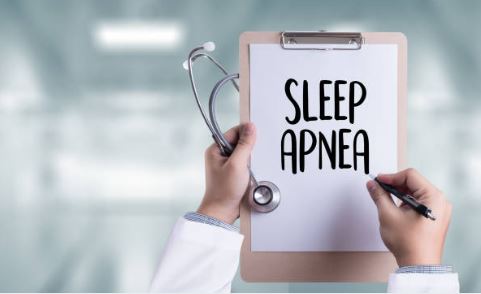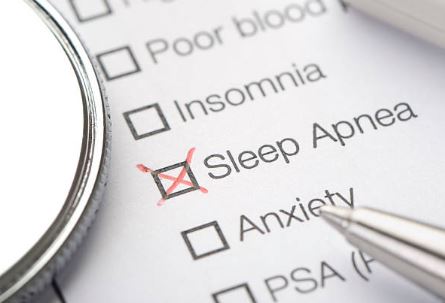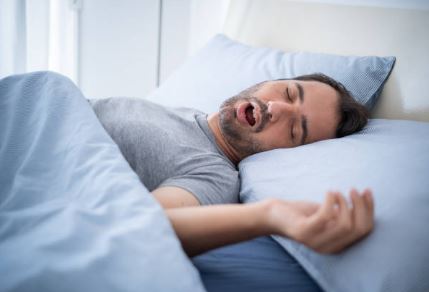
Can sleep apnea kill you? You won’t simply stop breathing, and it’s extremely unlikely that the breathing pauses caused by sleep apnea could directly result in death. However, OSA can raise your risk of developing potentially fatal medical conditions, some of which can result in unexpected demise. Continue reading, there are more facts about sleep apnea you should know.
Table of Contents
What is Sleep Apnea?
You may stop breathing repeatedly throughout the night if you have sleep apnea. This might be due to something obstructing the airway, or perhaps there’s a problem with your breathing reflex. There are three types of sleep apnea:
- Central: The brain fails to communicate with the breathing muscles.
- Obstructive: The airway is blocked by soft tissues in the neck or throat. This is the most typical kind.
- Complex: This is a combination of central and obstructive sleep apnea.
With sleep apnea, your breathing stops and starts as many as 400 times a night. The body is deprived of the oxygen it needs to function at its best as a result. Your personal and professional lives may suffer as a result of all those abrupt stops and starts.
If you routinely wake up feeling groggy, even after 7 to 9 hours of sleep, sleep apnea may be to blame. Other signs and symptoms to watch for are:
- Excessive daytime tiredness
- Poor concentration
- Irritability
- Fogginess or change in memory
- Morning headache
- Loud snoring
- Gasping for air while asleep
- Unrefreshing sleep
How to Classify Sleep Apnea?
Patients who experience breathing problems more frequently may ask for a sleep study to rule out possible Obstructive Sleep Apnea (OSA). The following categories are used to classify sleep apnea:
- Mild: 5-14 events per hour
- Moderate: 15-30 events per hour
- Severe: More than 30 events per hour
Monitoring the degree of the oxygen deprivation that results from these events is also essential. Hypoxemia is a condition where the oxygen saturation falls below 90%.
With each apnea event, the oxygen levels may drop significantly in the presence of heart or lung disease. Overnight, the body may be under more stress as a result. Long- and short-term effects are possible as a result of chronic oxygen deprivation.

Who is at Risk for Obstructive Sleep Apnea?
There is no absolute defense against developing sleep apnea. It has an impact on people of all ages and sizes. It is untrue that it only affects adults with bulkier bodies. Sleep apnea can also affect people who are within a healthy weight range and children.
Classic risk factors of sleep apnea include:
- Heavier body weight: Having a heavier body weight can cause more fat along the upper airway and narrow the opening. This is an issue in about 70% of adults with sleep apnea.
- Larger neck size: Do your shirts have a snug fit at the neck? Larger neck size is associated with increased tissue at the base of the tongue and upper airway. Airflow may be impeded by this.
- Enlarged tonsils: A windpipe obstruction can result from a large tonsil mass at the back of the throat. Additionally, large adenoids can make the nasal passageway smaller (at the back of the nose). Both of them may make breathing difficult.
- Chronic nasal congestion: It might be more difficult to breathe because this is frequently worse at night.
- Alcohol: The tongue and airway muscles may lose tone as a result and block the flow of air.
- Menopause: Once menopause starts, the drop in progesterone may cause the muscles of the tongue to relax. Additionally, the weight of this group tends to rise.
- Smoking: Smoke from cigarettes contains irritants that can result in throat and nasal swelling. This might close off the airway.
- Genetics: Your genetic makeup accounts for nearly 40% of sleep apnea cases. You are more likely to inherit sleep apnea if you have certain physical characteristics, such as the way your jaw and airway are shaped.
What Are the Risks of Sleep Apnea?
There are short-term risks and chronic risks listed.
Short-term Risks
Stopping breathing can cause cardiac arrhythmia, and it can also result in atrial fibrillation, a heart attack, or even a stroke.
As REM sleep occurs more frequently and sleeps apnea events are more likely to occur in the morning, these events appear to become more frequent in the morning. According to studies, there is a risk of sudden death during sleep between the hours of midnight and six in the morning. is about 2.5 times higher for people with OSA.
The good news is that using a CPAP machine and other treatments, like dental appliances, appears to reduce the risk of the majority of serious side effects, including persistent cardiac issues.
Chronic Risks
There is evidence that chronically irregular breathing during sleep can have significant negative effects on health. High blood pressure, diabetes, and heart disease may become more common as a result.
Additionally, it can cause depression and memory issues, worsen daytime sleepiness, and increase the risk of accidents.
When You Don’t Treat Sleep Apnea?

People with untreated sleep apnea (either because they don’t know they have it or they choose not to treat it):
- are more likely to have a heart attack (Sleep Health Heart Study results, 2001, American Journal of Respiratory Critical Care Medicine)
- have a 2 to 3 times higher risk of having a stroke (Sleep Health Heart Study results, 2010, American Journal of Respiratory Critical Care Medicine)
- face more than 3 times the risk of premature death (18-year follow-up of the Wisconsin Sleep Cohort, 2008, Sleep)
Furthermore, according to Yale University research, people who have had sleep apnea for up to five years are 30% more likely to die from a heart attack or have a stroke.
What Are the Other Connecting the Dots?
It is obvious that Fisher’s death was caused by heart disease, a well-known comorbidity with sleep apnea. Drug use and mental illness are two additional factors from the coroner’s report that have negative correlations with sleep apnea.
Heart Disease and Sleep Apnea
The estimated 22 million Americans who have sleep apnea are well-known in the medical community, with the vast majority of cases still going undiagnosed. According to some data on sleep apnea mortality, heart disease directly aggravated by sleep apnea is thought to be the direct cause of at least 38,000 deaths per year.
Given that cardiovascular disease accounts for one-fourth of all fatalities in the US, those who have a heart condition might do well to examine their sleep hygiene in order to better understand why. More people die from heart disease than from any other disease or condition, and at least 6% of those who die from it also had sleep apnea, according to research.
The way that heart disease affects women differs from how it affects men. Non-obstructive coronary artery disease and atherosclerosis are two types of cardiac issues that are more common in women.
Carrie Fisher experienced a heart attack due to atherosclerosis, which is the hardening of the arteries.
This type of heart disease develops when substances like fats and cholesterol adhere to artery walls, eventually stiffening and impairing the strength and elasticity of the heart. The heart, the most important muscle in the body, loses its ability to transport blood efficiently into and through it. A fatal result is poor or absent blood flow.
Sleep apnea can only make an already bad situation worse because it puts additional strain on heart function and depletes the body of blood oxygen.
Smoking, drug use, and binge drinking are additional risk factors for heart attacks because they over time result in a stiffened heart muscle, elevated blood pressure, and the accumulation of plaque in the arteries.
Drug Use and Sleep Apnea
According to Fisher’s toxicology report, her bloodstream contained cocaine, opiates, methadone, alcohol, and ecstasy. Continual use of illegal substances can harm one’s organs, increasing the likelihood of developing sleep apnea.
- Cocaine use (or use of other “snorted” drugs) damages the structures of nasal and upper airways, leading to the collapse of these tissues during sleep
- Opioids are well known for suppressing the respiratory system when it is at its most dependent on unconscious brain signaling during sleep. Opioid medications weaken the signals that the brain sends to the diaphragm, causing them to lose strength and reduce the tone of the muscles that should be contracting in unison to support breathing.
- Before going to bed, alcohol should be avoided because it has a significant respiratory depressant effect.
Sleeping problems and drug abuse appear to be related. People with untreated sleep disorders frequently use drugs or alcohol to get to sleep or stay awake during the day, according to a National Institutes of Health study that was published in 2009.
Sadly, substance abuse and use can also disrupt sleep, which only makes the situation worse.
Mental Illness and Sleep Apnea
Fisher was an outspoken proponent of mental health. She had bipolar disorder, and she may have tried to self-medicate by taking a lot of these medications over the course of her life.
Furthermore, it’s critical to remember that sleep apnea can cause mood disorders and depression because of how it affects the neurochemical function of the brain. Although mood swings caused by these chemical imbalances and/or associated sleep deprivation for people with sleep apnea are a separate medical condition from bipolar disorder, this additional condition’s negative effects on bipolar disorder cannot be discounted.
All of this together composes a vicious cycle within the context of (likely) untreated sleep apnea:

- Sleep apnea can cause mood disorders and other mental health issues due to sleep fragmentation, fatigue, and deprivation
- Illicit drug use can also lead to mood, behavior disorders, and risky behaviors such as substance abuse (to self-medicate for problems with insomnia and daytime fatigue)
- Mental health issues that crop up as the result of untreated sleep apnea may lead to the use of drugs and alcohol, which can then worsen preexisting mental health problems
- For those with untreated sleep apnea, the cycle continues because of ongoing concerns related to insomnia, excessive daytime sleepiness, emotional fatigue, suicidal ideation, and other sleep-related mental health problems
What is the Danger of Sleep Apnea?
Having obstructive sleep apnea increases your risk of high blood pressure (hypertension). Your risk of recurrent heart attacks, strokes, and abnormal heartbeats like atrial fibrillation may also increase if you have obstructive sleep apnea.
What Happens If You Don’t Treat Sleep Apnea?
Sleep apnea, particularly when the disorder goes undiagnosed or untreated, has been linked to a wide array of health problems, such as cardiovascular disease, diabetes, and even glaucoma, and it may also increase your risk of death.
What is the Main Cause of Sleep Apnea?
In adults, the most common cause of obstructive sleep apnea is excess weight and obesity, which is associated with the soft tissue of the mouth and throat. This soft tissue can cause the airway to become blocked while you’re sleeping because your throat and tongue muscles are more relaxed.
How Long Can You Live With Sleep Apnea?
If left untreated, obstructive sleep apnea can shorten your life by anywhere between 12-15 years. Obstructive sleep apnea cannot be permanently cured, but it can be managed with treatment.
Conclusion
Don’t rule out the possibility that you or a loved one you know has sleep apnea if you snore loudly and frequently, have unexplainably high blood pressure, experience gasping or choking while asleep, experience chronic daytime fatigue, or wake up with a dry mouth, sore throat, or headache. There are several methods for treating this chronic medical condition, and straightforward home tests can help rule the condition in (or out).